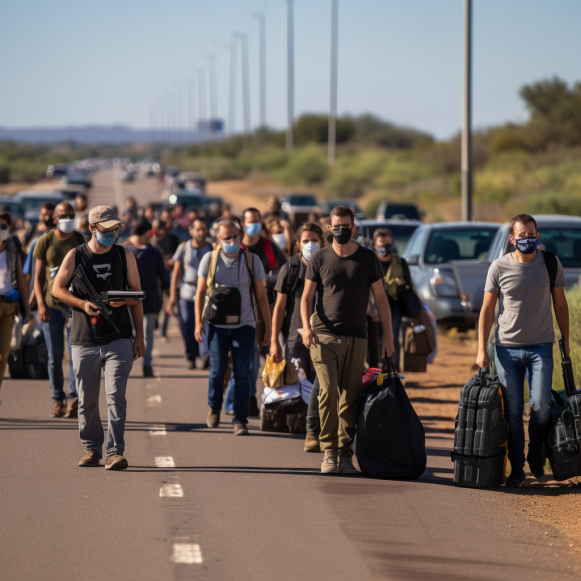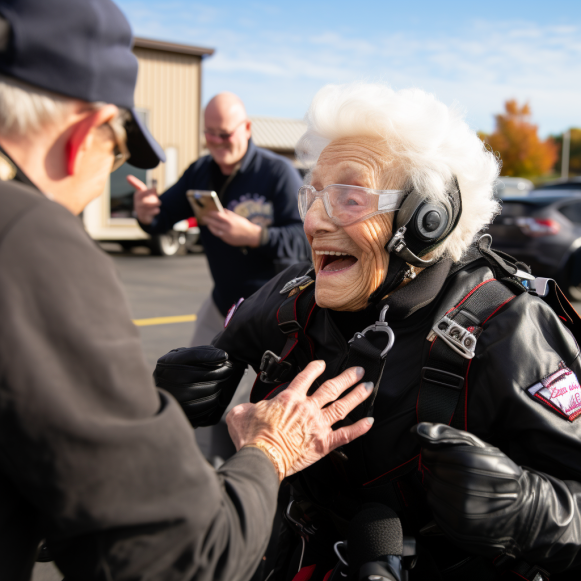‘Home is home’: Israelis put lives in the Bay Area on pause after Hamas attacks in Israel

The support comes after the deadliest attacks on Israel’s soil in decades
Avi Markson spent weeks this fall basking in the warmth and camaraderie of his family in Israel — a perfect first vacation, he said, from his new San Jose-based home remodeling job, which he landed earlier this year.
Then there were the air raid sirens, the decision to cancel his flight back to the Bay Area, and the message to his San Jose employer that he wouldn’t be returning to work for a while.
“There was no thought about it,” Markson admitted. “If my brothers are fighting, I’m going to be fighting.”
This week, many Israelis in the Bay Area put their lives on hold to either stay in their homeland or jet halfway around the world to help Israel respond to the deadliest attack on its soil in decades. Some were active reservists in the Israeli armed forces, among the 360,000 Israelis called to action in the country’s largest military mobilization in decades. Others, like Markson, chose to volunteer in the nation’s armed forces or to help with civilian relief efforts across the country.
They gave up their children, careers, and comfortable lives in the Bay Area to fight in a war with few precedents in Israeli history.
“I did have a life there, but none of that matters now, if I’m being honest,” said Markson, 25, who was born in Israel and moved to the United States after serving a three-year mandatory military service in Israel as a young adult. He relocated to San Jose two years ago and has recently started working as a project manager for O.T Bay Builders.
“The only thing that really matters now is to fight this war and make them (Hamas) pay for what they did — and bring back the peace, and mainly the quiet, to all the citizens here in Israel,” he said in a statement.
Several other Bay Area residents were torn this week between returning from vacation and helping their homeland.
Yoav Ben-Shushan, a Bay Area resident for decades, arrived in Israel on Oct. 5 with his family for their annual trip to visit relatives and enjoy the picture-perfect weather along the northern coastal town of Atlit. However, a day after Hamas’ attack, he arranged for his wife and two children, ages 7 and 5, to fly back to Mill Valley while he volunteered with humanitarian efforts near Tel Aviv.
“I don’t think I’d ever be able to forgive myself if I got on that airplane with my kids and wife,” said Ben-Shushan, executive director of Israel Bonds. “Knowing that people need help here, there are human instincts that we all follow.”
Ben-Shushan spoke via WhatsApp Friday evening after assisting with a command center for humanitarian relief, distributing blankets, mattresses, beds, and clothes to Israelis in need. He was “exhausted,” having worked 18-hour days this week for a group that has shifted its focus from protesting the government’s judicial reforms to assisting displaced civilians and soldiers fighting Hamas.
“Once you grow up in Israel, it’s ingrained in you for the love for the country, the people, the culture,” she said. “I’m not religious, but home is home.”
It is unclear how many Israelis living in the Bay Area and California left this week to return to Israel or took extended trips to serve. Given the number of commercial airlines that have cancelled flights to Tel Aviv, many people have found it difficult to book an international flight. And many Jews were already in Israel on vacation for the joyous Sukkot holiday, which ended the day before the attacks.
Nonetheless, the ethos of military service is deeply embedded in Israeli culture, with laws requiring at least three years of military service for men and two years for women. It all stems from Israelis’ enduring desire to defend the country against the terrors that Jews have faced throughout history, making it “really a central institution to Israeli life and for many, many, many years the most respected institution in Israeli life,” he said.
Given the hostility that Israel has faced from neighboring countries, even active reserve duty — in which Israelis spend a few weeks a year serving in the military while always on call in case of war — has been viewed as an essential part of life for the country.
“The neighborhood is not such that you can just ignore it,” says Ido Segev, a former lieutenant colonel in the Israeli armed forces who now lives in the Bay Area and has assisted Israelis in returning to the Middle East in the aftermath of Hamas attacks. “We understand that if we do not have a strong army to defend the country, we will not have a country.” People realize it’s a must, a requirement.”
That legacy of service has been put to the test in recent years, according to David Myers, a UCLA professor of Jewish history, including during a recent wave of protests against the Israeli government and Israeli Prime Minister Benjamin Netanyahu’s controversial attempt to limit the power of Israel’s judiciary. According to Oded Hermoni, co-founder and managing partner of Silicon Valley venture capital firm J-Ventures, the majority of the Bay Area’s thousands of Israelis and Jews opposed the move and participated in massive protests.
However, the heinousness of Hamas’ attacks on Israelis has compelled Hermoni and many other Israel-connected Bay Area friends and associates to put their politics on hold, he claims.
“I was one of the people who protested against Netanyahu over the last year,” Hermoni, an Israeli-born dual citizen, explained. “Almost all of my friends were protesting Netanyahu, but right now in the war, you don’t pay attention to politics; you pay attention to managing the war and putting criticisms and (political) conflicts aside in order to unite against the enemy.”
Despite Israel’s political turmoil this summer, Levy Gerzberg, 78, said the country is now solidly united, horrified by “the extreme cruelty of Hamas” and images of kidnappings and murders of families and teenagers. He arrived in Israel hours before the attacks to attend a wedding, then spent the next week attending a funeral and hiding in bomb shelters.
The attacks reminded him of the surprise invasion that began the Yom Kippur War in 1973 on the holiest day in the Jewish calendar. Gerzberg had arrived at Stanford for his PhD just a year before, where he met another Israeli student. That young man was Ehud Barak, a colonel in the Israeli military at the time who was summoned to join the war effort and went on to become Israel’s 10th prime minister.
“Israel understands that in times of crisis, we must band together,” Gerzberg said.
The fight’s trajectory — and the growing dangers that those soldiers may face — is unknown. The country appears increasingly likely to invade Gaza, which could shift the style of warfare from primarily aerial and rocket attacks to an urban, door-to-door battle reminiscent of the bloodiest years of the US war in Iraq.
It’s unclear when that campaign will end. That means an uncertain future for many people, including Markson.
“However long it takes and wherever they’re going to tell me to go, I’m going to be here,” he said.





